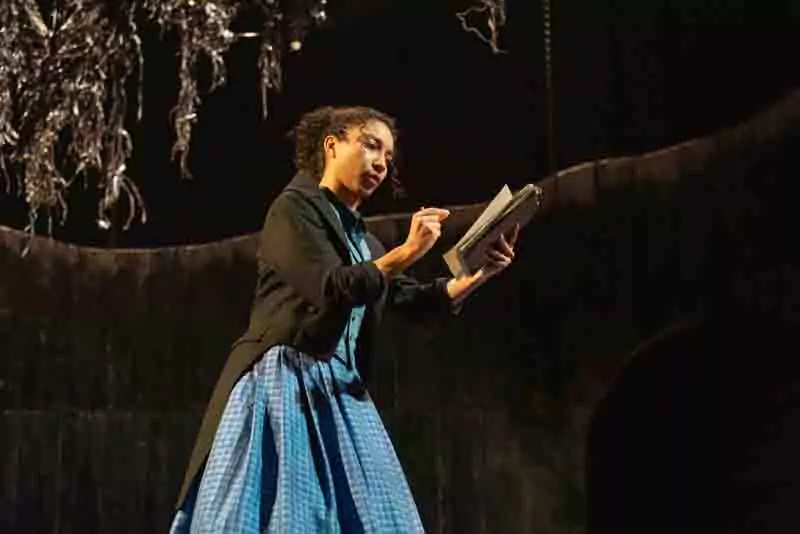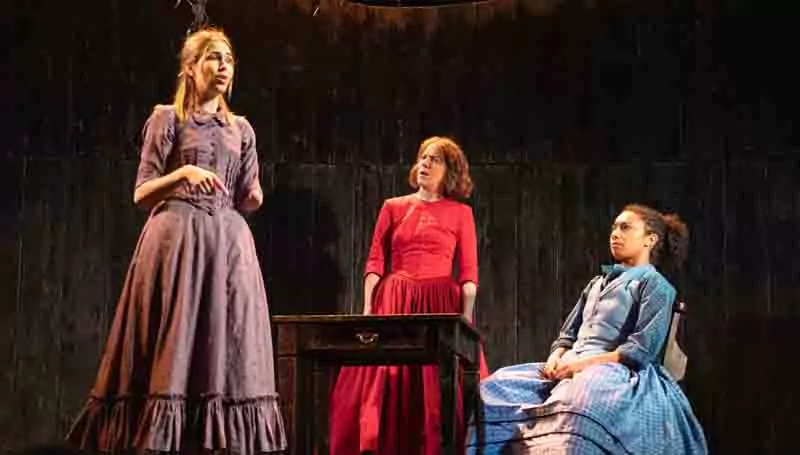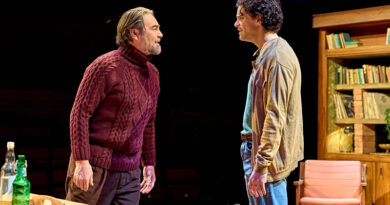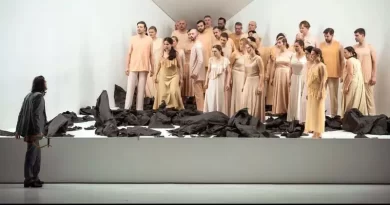“Underdog: The Other Other Brontë” at the Dorfman, National Theatre
Simon Jenner on the South Bank
8th April 2024
“This … is not about me,” Charlotte Brontë (Gemma Whelan) keeps asserting, after asking the audience what their favourite Brontë novel is. Then often qualifies it: “But Reader … I think you know who’s most quotable.” Sibling rivalry and support powers Sarah Gordon’s Underdog: The Other Other Brontë, which premieres at the National Theatre’s Dorfman before proceeding to Northern Stage in Newcastle upon Tyne. This comically irreverent take on the Brontë legend is given an almost vaudevillian production by Northern Stage’s artistic director Natalie Ibu.

The ensemble.
Photo credit: Isha Shah.
Anne (Rhiannon Clements) and Emily (Adele James) try modifying, nudging, challenging the survivor’s narrative and turn competing storytellers as genteel Victorian dress-rustling turns hustling. A fourth Brontë sibling, Branwell, just droops with themes and plot-points for his sisters. The underdog of the title, Anne, gets credited with all the ideas, from writing novels to using pseudonyms, to gritty social realism. In Gordon’s hands Anne emerges as the most modern, even post-modern sister.
Deeply informed as she is, Gordon is above all going to wreak havoc with Brontë-worship, particularly with Charlotte. Clements moves seamlessly from the peacemaker she’s portrayed as, to critical mother. Charlotte’s not impossible to love, as Anne counters her elder’s self-pity – just very difficult. Clements’ Anne above all brings the nearest we get to critical engagement with myth, warmly delivered like the family’s most sympathetic therapist.
Certainly Agnes Grey (prototype, Anne and Emily assert, of Jane Eyre) and the radical The Tenant of Wildfell Hall are pioneering. And Charlotte’s masterpiece emerged after her sisters’ first novels were accepted and her own debut The Professor rejected. Watch the teeth-grinding. Despite this, Anne’s placatory nature ensures she’s almost written out of the serious writing contest. Charlotte indeed supressed bestseller The Tenant of Wildfell Hall after Anne’s death.
Charlotte leads the storytelling in her blazing red dress (the ensemble’s initially kitted out in red shirts too, like a Charlotte chorus). Anne’s in heather, and Emily in an electric royal blue. It’s a button-holing swagger, life-affirming, yet Charlotte immediately takes credit for every idea Anne has. With an insatiable lust for fame. Whelan also revels in the broadest accent, and Clements – Anne stigmatized as a mouse – the least. With Charmian Hoare’s dialect coaching, this seems a conscious choice, underscoring the perils of gentility.

Adele James as Emily.
Photo credit: Isha Shah.
Emily is uncharacteristically sidelined in this work. She summarizes though the case against Charlotte: “You know you’ve never dared compete with me like you have her. Because you needed someone lower, someone you found less threatening … And she has been stupid and kind enough to let you. And I will never, never forgive you for it.” Gordon catches Emily’s particular vehemence, with James making much of the relatively few but trenchant speeches she gets. Gordon’s Emily fights for privacy, autonomy; and unleashes fury at being posthumously edited.
The most theatrical moment comes when Emily and Anne act out a death scene in Charlotte’s next novel Shirley modelled on Emily – and at one point Anne’s final illness. They literally corpse it, helpless with silent laughter.
Branwell (James Phoon) enjoys a few early romps as a drunk and there’s a powerful scene as he and Emily fight upstage (in Haruka Kuroda’s fight and intimacy direction) as Clements’ Anne sprawls downstage transmuting it into fictional gold.
Kwaku Mills provides a vivid cameo as servant Tabby and brattish Cunliffe, a bird-torturing boy in Anne’s charge. Julian Moore-Cook’s almost Rochester-like publisher George Smith bestrides Charlotte’s fantasy, and it’s no accident the same actor plays her earlier crush Mr Heger. Both dismiss her as a woman, especially when the ensemble arrives, tattling in blue-striped top-hats like a travelling circus of critics.
Adam Donaldson’s sneering rackety publisher Thomas Newby is the apotheosis of his other main role as head-teacher Mr Brocklehurst, himself one parsonic sneer. Nick Blakeley’s uproarious as snobby Mrs Ingham treating Anne as a sub-species, as well as novelist-cum-PR-machine Elizabeth Gaskell, determined to sanitize Charlotte, just as Charlotte had her sisters: she even places her in an illuminated glass cube.
Gordon chooses to leave some vexed questions she might have capitalized on: whether Charlotte or Emily herself destroyed Emily’s second novel (possibly the largest single loss to 19th-century literature). And Phoon’s Branwell isn’t the writer who rendered the finest 19th-century English translations of Horace. This is a competition.
The play’s rowdy energy is enhanced by the exuberant use of revolve staging, in Grace Smart’s design. A thicket of northern gorse rockets upwards like a spaceship after the first scene, never to reappear. There are two cavernous doorways like entrances to train tunnels. Everything from writing desks to unfeasibly wheeled carriages to an illuminated glass box for Charlotte-the-icon sweep on and off, against gorgeous period punk-inflected costumes.
Zoe Spurr’s lighting flicks from candlelit parsonage to garish disco; and Alexandra Faye Braithwaite’s sound design is anything but classical. Ingrid Mackinnon’s movement direction spins a carousel of storytelling on the revolve.
Underdog: The Other Other Brontë is the most riotous retelling of literary myth, punching so fast it shortens its estimated two hours 15 by about eight minutes. It’s exhilarating, hilarious, and skewers a few truisms with all-too-plausible truths. Catch it before it flies as far north as that screen of gorse.









